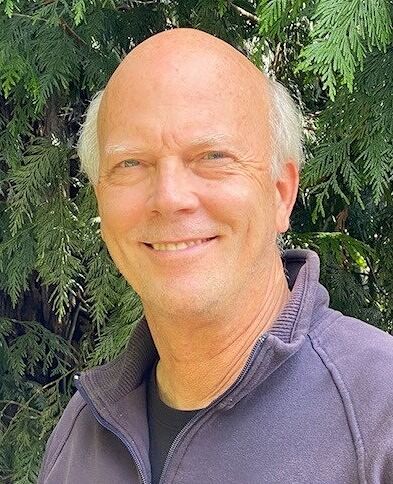Freedom and life wither and die without faith, hope, love, and truth..... Pete Bylsma
ABOUT PETER J. BYLSMA
Peter James Bylsma was born in Chester, Pennsylvania on December 26, 1953. He was the first son and second child of Norman “Bud” Bylsma and Patricia “Patti” Bylsma. His father worked for Young Life, a Christian organization that focused its outreach to teenagers. His father was transferred to Baltimore where his two brothers were born, and then the family moved again to Silver Springs, Maryland. “Pete” started kindergarten when he was four years old, and he spent his time exploring the forest and fearlessly climbing tall trees. When he was six years old, he traveled by car with his father and sister across the country to Palo Alto, California where he finished 2nd grade. A few months later, the family moved to San Jose where Pete excelled in football, basketball, baseball, and track at his new school. In the middle of 7th grade, the family moved again to southern California, and Pete continued excelling in these four sports in middle school and high school in La Habra, California. His faith journey began when he became a Christian at a Young Life camp in Colorado when he was 12.
After he finished 9th grade, his father was transferred again, and the family moved to Hinsdale, Illinois, a suburb of Chicago. He made friends quickly as he joined the football, basketball, and baseball teams. He excelled in football as a wide receiver — he was undersized at 5’10” and 160 pounds, but the coordination, speed, and abilities he developed in the other sports allowed him to break every school receiving record at Hinsdale Central. He set a state record in receiving yards gained in one game in 1971 that went unbroken for nearly 40 years, and he was named to the Chicago Times All-Area and Illinois All-State football teams.
Pete graduated from high school in 1972 and attended the U.S. Air Force Academy in Colorado Springs. After finishing basic training and his first semester, he transferred to Wheaton College, a highly selective non-denominational Christian liberal arts college in Wheaton, Illinois. He joined the football team in 1973, played for three years, and set every school receiving record. He received the MVP and Scholar Athlete awards, was named to the All-Conference team twice, and was the second leading receiver in the nation his senior year. He later was named to the college’s Hall of Fame. Academically, he majored in psychology and graduated with high honor (3.60 GPA) in 1976. After graduating, he finished his student-teaching work and earned an Illinois secondary teacher certificate. He traveled twice to Europe to take college courses and work in the Netherlands and travel the continent.
Pete’s first full-time job was as a teacher and coach at an international school in Seoul, Korea (Seoul Foreign School) that served the business, diplomatic, and faith-based communities. From 1977 to 1979, he taught five different subjects at the middle and high school levels and coached basketball and tennis. Three of his teams were undefeated, and one basketball team surprised everybody when it won an international high school tournament in Japan after beating three highly ranked teams. One year he volunteered to lead a church youth group, and in the summer, he worked part-time in a Korean business and traveled to China, Taiwan, Hong Kong, and Thailand.
He returned to Portland, Oregon in August 1979 where his parents had moved from Illinois. His teaching certificate was not valid in Oregon, so he got a job working for World Concern, an international Christian relief and development agency based in Seattle. He recruited and trained church sponsors to resettle refugees from southeast Asia on behalf of World Relief. After resettling 400 refugees in Oregon, World Concern sent him to work in refugee camps in Malaysia to help the Vietnamese boat people who were waiting to be relocated in other countries. Working with the Red Cross and UNHCR, Pete set up school systems so the refugees could learn English. He later worked with U.S. immigration and State Department officials to interview and investigate the stories of refugees seeking resettlement in the United States.
In August 1981, he returned to Portland, got married, and moved to Seattle to work in the main office of World Concern. He coordinated the agency’s refugee and relief operations for three years, and he traveled several times to various Asian countries. After being laid off for budgetary reasons in 1984, he became the Executive Director of New Horizons Ministries, a Christian agency providing social services to more than 1,000 runaways and street youth involved in high-risk activities in the Seattle area. At the time, he was also attending graduate school at the University of Washington to study public sector management —he planned to use the degree in a non-profit setting. After expanding New Horizons’ programs and putting it on solid financial and administrative ground, he resigned so he could finish his master’s degree.
He graduated with a master’s degree in public administration (MPA) in 1987 and went to work for the U.S. Government Accountability Office (GAO), the bipartisan investigative arm of Congress that provides federal leaders with unbiased evaluations to improve the efficiency and effectiveness of domestic and international programs. Pete worked for GAO for 11 years in its Seattle and European offices and investigated issues related to health care, energy production, the environment, K-12 school finance, international trade and assistance, and military policy. His 5-year assignment in Europe (based in Frankfurt, Germany) dealt mainly with Congressional interests in Africa, Eastern Europe, Russia, Central Asia, and Middle East. He worked closely with US and foreign government officials, contractors, private businesses, non-profit agencies, and international agencies while traveling extensively in the United States and 19 countries and holding diplomatic status and multiple top-secret security clearances. He was credentialed as a Certified Government Financial Manager (CGFM) while working at GAO.”(His 15 written reports to Congress are listed below).
While living in Germany, he and his wife adopted a toddler, and after they moved back to Seattle, they adopted two older siblings. All three of their children had special needs, and the family moved to Olympia, Washington in 1998 so the children could attend better schools. Pete got a job working for the Washington legislature, doing similar work he had done for GAO. His report about how money impacted student performance in the public school system led him to take a new position in the Office of Superintendent of Public Instruction (OSPI), the state’s K-12 education agency. He was the state director of research, evaluation, and accountability for seven years and wrote many reports to help improve K-12 systems. He joined the Washington Educational Research Association (WERA) and served two 3-year terms as its President. He published many articles for its journal and was the editor of the journal for four years. (All these reports and articles, some of which are used worldwide, are listed below.)
In 2006 Pete returned to the Seattle area and started working for the Bill & Melinda Gates Foundation. As a senior evaluation officer, he led the foundation’s work that studied the impact of its K-12 education grants worth more than $2 billion. He left the foundation in 2007 and worked as an independent contractor providing evaluation, data collection/analysis, and policy-related services to various government organizations, school districts, non-profit organizations, and foundations. During this time, he completed his doctorate (EdD) in educational leadership and policy studies at the University of Washington and earned a school district superintendent credential.
In 2010 Pete remarried and spent the next 10 years working in the central offices of two school districts in the Seattle suburbs (Renton and Mukilteo). His responsibilities in both districts included leading the research, assessment, data collection, and data analysis work; he also worked closely with school and district leaders to design and implement school improvement policies and practices. He retired from public service in 2020 soon after COVID-19 caused the closure of schools statewide.
Just before retiring, he started researching and writing The Short Bible: A Chronological Summary of the Old and New Testaments (WestBow Press), which was published in August 2021. He later created even shorter versions for difference audiences (The Simplified Short Bible, The Very Short Bible, and translations of these books into other languages). In 2024 he published The Bible I Never Knew: A Closer Look at Christianity's Main Themes and launched a new non-profit self-publishing company, Byblio Press, to help new authors publish their books quickly and cheaply. He now spends his time running the Bylsma Foundation and Byblio Press, developing other versions and translations of his books, consulting with non-profit and private sector organizations, traveling the world, and spending time with his extended family while living in Kirkland, Washington and at his cottage on Swinomish tribal land in the nearby town of La Conner.
EDUCATION PUBLICATIONS
Author, “Washington’s Revised Achievement Index: Are the School Ratings Fair?” (2017), in WERA Educational Journal, May 2017.
Author, “Using SGPs to Measure Student Growth: Context, Characteristics, and Cautions” (2014), in WERA Educational Journal, March 2014.
Author, “How Education Funding Relates to Student Outcomes” (2013), in WERA Educational Journal, August 2013 (WERA Distinguished Paper).
Author, “Can We Trust Staff Perceptions of School Quality?” (2012), in WERA Educational Journal, Winter 2013.
Author, “A New Accountability System: Building a Better Mousetrap” (2009) in Leadership Information, Volume 8-2, Olympia, WA: Washington Assoc of School Administrators.
Author, Recommendations for a New State Accountability Index (2009), written for the Washington State Board of Education.
Author, Differences in Staff Perceptions of School Quality (2008), doctoral dissertation, Seattle, WA: University of Washington
Author, New Compensation Model for Certificated Instructional Staff (2008), Olympia, WA: OSPI.
Author, Staffing Model: Effective, Manageable Class Sizes (2008), Olympia, WA: OSPI.
Author, Creating a Comprehensive Teacher Data System (2007), Silverdale, WA: Center for Strengthening the Teaching Profession.
Project Supervisor/Co-author, The High Schools We Need: Improving an American Institution (2006), Olympia, WA: OSPI.
Project Supervisor/Co-author, Helping Students Finish School: Why Students Drop Out and How to Help Them Graduate (2003, 2006), Olympia, WA: OSPI.
Project Supervisor/Co-author, Nine Characteristics of High Performing Schools: A Research-based Resource for Schools and Districts to Assist with Student Learning Olympia, WA: OSPI.
Project Supervisor, How Do Washington's Graduation Tests Measure Up? (2005), Washington, DC: Achieve.
Project Supervisor/Co-author, Promising Programs and Practices for Dropout Prevention: Report to the Legislature (2005), Olympia, WA: OSPI.
Project Supervisor/Co-author, Characteristics of Improved School Districts: Themes from Research (2004), Olympia, WA: OSPI.
Project Supervisor/Co-author, Addressing the Achievement Gap (2002), Olympia, WA: OSPI.
Author, Graduation and Dropout Statistics for Washington's Counties, Districts, and Schools (2002, 2003, 2004, 2005), Olympia, WA: OSPI.
Project Supervisor, Washington's Initiative 728: Examining the First Year of Implementation (2003), Seattle, WA: University of Washington Educational Leadership and Policy Studies.
Author, Educating English Language Learners in Washington State (2003), Olympia, WA: OSPI.
Author, Educating Limited English Proficient Students in Washington State (2002), Olympia, WA: OSPI.
Project Supervisor, Relationship Between the WASL and Placement Tests Used by Community and Technical Colleges (2002), Olympia, WA: Social and Economic Sciences ResearchCenter.
Project Supervisor, A Review of the Washington Assessment of Student Learning in Mathematics: Grades 7 and 10 (2002), Menlo Park, CA: SRI International.
Project Supervisor/Author, Study of the Grade 4 Mathematics Assessment (2000), Olympia, WA: OSPI.
Editor, Teaching and Learning Mathematics (2000), Olympia, WA: OSPI.
Project Supervisor/Author, K-12 Finance and Student Performance Study (1999), Olympia, WA: State of Washington Joint Legislative Audit and Review Committee.
Senior Evaluator in Charge, School Finance: State Efforts to Equalize Funding Between Wealthy and Poor Districts (1998), Washington, DC: U.S. Government Accountability Office.
Senior Evaluator, Student Testing: Issues Related to Voluntary National Mathematics and Reading Tests (1998), Washington, DC: U.S. Government Accountability Office.
Senior Evaluator in Charge, School Finance: State and Federal Efforts to Target Poor Students (1998), Washington, DC: U.S. Government Accountability Office.
Senior Evaluator in Charge, School Finance: State Efforts to Reduce Funding Gaps Between Poor and Wealthy Districts (1997), Washington, DC: U.S. Government Accountability Office.
OTHER PUBLICATIONS
Author, The Bible I Never Knew: A Closer Look at Christianity's Main Themes (2024), Kirkland, WA: Byblio Press.
Author, The Very Short Bible: The Condensed Story of the Old & New Testaments (2024), Kirkland, WA: Byblio Press. (Available in other languages)
Author, The Simplified Short Bible: A Short Chronological Summary of the Old & New Testaments (Updated 2024), Kirkland, WA: Byblio Press. (Available in other languages and a Student Edition)
Author, The Short Bible: A Chronological Summary of the Old & New Testaments (2021), Bloomington IN: WestBow Press. (Available in other languages)
Project Supervisor, Effects of Certificate of Need and Its Possible Repeal (1999), Olympia, WA: State of Washington Joint Legislative Audit and Review Committee.
Senior Evaluator in Charge, Foreign Assistance: Assessment of Selected USAID Projects in Russia (1995), Washington, DC: U.S. Government Accountability Office.
Senior Evaluator, Foreign Assistance: Inadequate Accountability for U.S. Donations to the World Food Program (1994), Washington, DC: U.S. Government Accountability Office.
Senior Evaluator, Mozambique: Insufficient Effort Made to Attract U.S. Suppliers Under AID Commodity Program (1994), Washington, DC: U.S. Government Accountability Office.
Senior Evaluator, Peace Corps: New Programs in Former Eastern Bloc Countries Should Be Strengthened (1994), Washington, DC: U.S. Government Accountability Office.
Senior Evaluator, Environmental Issues in Europe: U.S. Efforts to Help Resolve Institutional and Financial Problems (1994), Washington, DC: U.S. Government Accountability Office.
Senior Evaluator, International Trade: Assessment of the Generalized System of Preferences Program (1994), Washington, DC: U.S. Government Accountability Office.
Senior Evaluator, Homosexuals in the Military: Policies and Practices of Foreign Countries (1993), Washington, DC: U.S. Government Accountability Office.
Author, “What Eastern Europe Needs Now” (1992), in GAO Journal, Number 16, Fall/Winter.
Senior Evaluator in Charge, East European Energy: Prospects for Improvement in Albania's Energy Sector (1992), Washington, DC: U.S. Government Accountability Office.
Evaluator, East European Energy: Romania's Energy Needs Persist (1992), Washington, DC: U.S. Government Accountability Office.
Evaluator, East European Energy: U.S. Business Opportunities in and Assistance to Poland’s Energy Sector (1991), Washington, DC: U.S. Government Accountability Office.
Evaluator, VA Health Care: Better Procedures Needed to Maximize Collections From Health Insurers (1990), Washington, DC: U.S. Government Accountability Office.
Evaluator, VA Health Care: VA Health Care: Medical Centers Need to Improve Collection of Veterans' Copayments (1990), Washington, DC: U.S. Government Accountability Office.
Evaluator, Scenic Byways: A National Program, if Created, Should Be Small Scale (1990), Washington, DC: U.S. Government Accountability Office.
Author, Disaster Relief Handbook (1987), Seattle, WA: World Concern.
Author, The Simplified Short Bible: A Short Chronological Summary of the Old and New Testaments (2022), Kirkland, WA: Byblio Press (available in a Student Edition and in multiple languages).
Author, The Very Short Bible: The Condensed Story of the Old and New Testaments (2024), Kirkland, WA: Byblio Press (available in multiple languages).
Author, The Bible I Never Knew: A Closer Look at Christianity's Major Themes (2024), Kirkland, WA: Byblio Press.




